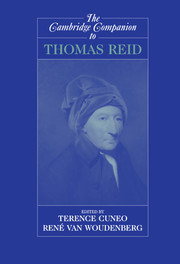Book contents
- Frontmatter
- Introduction
- 1 Reid in Context
- 2 Thomas Reid and the Culture of Science
- 3 Reid on Common Sense
- 4 Reid’s Theory of Perception
- 5 Reid’s Reply to the Skeptic
- 6 Nativism and the Nature of Thought in Reid’s Account of Our Knowledge of the External World
- 7 Reid and the Social Operations of Mind
- 8 Reid on Memory and the Identity of Persons
- 9 Thomas Reid’s Theory of Freedom and Responsibility
- 10 Reid’s Moral Philosophy
- 11 Reid’s Philosophy of Art
- 12 Reid’s Philosophy of Religion
- 13 Reid’s Influence in Britain, Germany, France, and America
- Bibliography
- Index
1 - Reid in Context
Published online by Cambridge University Press: 28 May 2006
- Frontmatter
- Introduction
- 1 Reid in Context
- 2 Thomas Reid and the Culture of Science
- 3 Reid on Common Sense
- 4 Reid’s Theory of Perception
- 5 Reid’s Reply to the Skeptic
- 6 Nativism and the Nature of Thought in Reid’s Account of Our Knowledge of the External World
- 7 Reid and the Social Operations of Mind
- 8 Reid on Memory and the Identity of Persons
- 9 Thomas Reid’s Theory of Freedom and Responsibility
- 10 Reid’s Moral Philosophy
- 11 Reid’s Philosophy of Art
- 12 Reid’s Philosophy of Religion
- 13 Reid’s Influence in Britain, Germany, France, and America
- Bibliography
- Index
Summary
In this chapter Thomas Reid (1710-1796) will be placed in context, with the aim of providing a perspective from which his thoughts can be better understood. Attention will therefore be focused primarily on the swirl of ideas, philosophical, theological, and scientific, to which he was exposed. Intimately related to that swirl of ideas is the part played throughout Reid's life by the Kirk, Scotland's national church. His father, Lewis Reid (1676-1762), was a minister of the Kirk. Reid himself studied its theology at Marischal College, Aberdeen (1726-31), acted as a clerk of presbytery in the parish of Kincardine O'Neil (1732-3), and was parish minister (1737-51) in the parish of New Machar in Kincardineshire. Also, on several occasions he represented his university, first King's College, Aberdeen, and then Glasgow University, at the annual meeting of the General Assembly of the Church of Scotland, the Kirk's parliament. Late in life he was also a founding member of the Glasgow Society of the Sons of Ministers of the Church of Scotland.I Reid’s views on religion and on the place of the Kirk in society were fully consistent with those of the Moderate party in the Kirk.2 And what may be termed his “religious demeanor” was likewise on the side of moderation, as is indicated by his description of the people of Glasgow who have a “gloomy, Ent<h>usiastical Cast” C: 38),3 and are “fanatical in their Religion,” though he continues in mitigation of their demeanor: “The Clergy encourage this fanaticism too much and find it the onely way to popularity.
- Type
- Chapter
- Information
- The Cambridge Companion to Thomas Reid , pp. 31 - 52Publisher: Cambridge University PressPrint publication year: 2004
- 8
- Cited by



